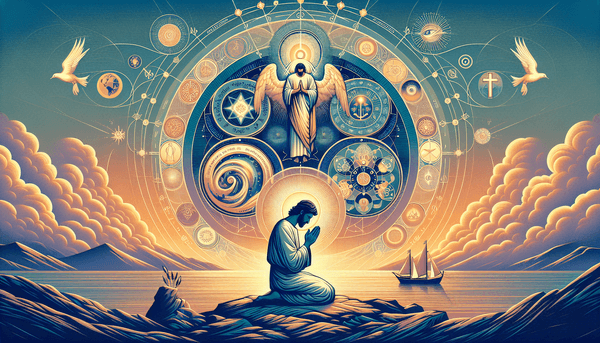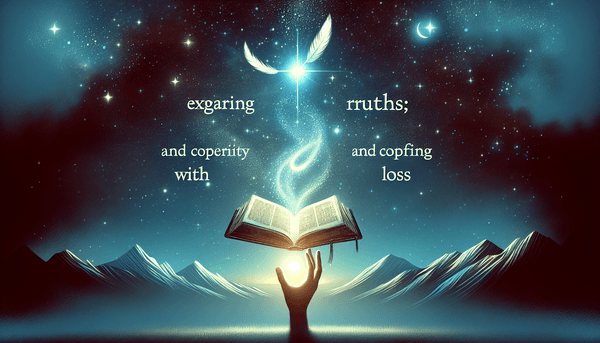The Groaning of Creation and Believers
The apostle Paul captures the essence of a world in travail in Romans 8:21-23, where he speaks of creation groaning 'as in the pains of childbirth' and believers themselves groaning inwardly for our adoption to sonship and the redemption of our bodies. This groaning is a metaphor, illustrating a deep, universal yearning for the redemption that is yet to come. It speaks to the 'firstfruits of the Spirit,' a foretaste of what is to come, that believers possess, which engenders an even greater longing for the fulfillment of God's promises. In this tension between present suffering and future hope, we find a powerful expression of faith. As the creation waits in 'eager expectation for the children of God to be revealed' (Romans 8:19), we too are called to live in a hopeful anticipation for the time when 'He will wipe every tear from our eyes' and there will be 'no more death or mourning or crying or pain' (Revelation 21:4), when all things are reconciled through Christ (Colossians 1:20).
Jesus' Trial and Crucifixion
The narrative of Jesus' trial and crucifixion, as told in Luke 23:1-34, presents a stark portrayal of injustice and human suffering. Jesus, brought before Pontius Pilate and Herod, is found without fault yet is subjected to the will of a frenzied crowd demanding his crucifixion. In the midst of this suffering, Jesus responds not with condemnation but with a profound moment of forgiveness, praying for those who crucify Him. He engages with the criminals on the cross, promising paradise to the repentant thief. This passage serves as a powerful reminder of Jesus' sacrifice, encapsulated by the words 'It is finished' (John 19:30) and symbolized by the tearing of the temple curtain (Mark 15:38), heralding a new covenant between God and humanity.
The Hope and Promise of Redemption
The concept of redemption in scripture is often likened to a transformative process, much like childbirth, leading to a new beginning. Romans 8:21-22 tells us that the creation itself will be liberated from its bondage to decay, speaking to the restoration and renewal of all things in God's kingdom. This hope is not just a distant dream but an active, sustaining force for believers. As 'we know that in all things God works for the good of those who love him' (Romans 8:28), we are reassured that life's present challenges are part of a larger, divine narrative that leads to life and freedom. The scriptures hold out a promise that 'in Christ all will be made alive' (1 Corinthians 15:22) and beckon us to hold fast to this hope as 'an anchor for the soul, firm and secure' (Hebrews 6:19), while we wait for the day when we can say, 'Come, Lord Jesus' (Revelation 22:20). For further insight into living out our beliefs amid life's challenges, explore our article on finding strength and unity in biblical insights on temptation, faith, and Christian living.
FAQ
Q: What does Romans 8:22-23 mean?
A: This passage discusses the spiritual and physical longing for redemption. It describes how all of creation, including humanity, is in a state of longing and anticipation for the fullness of God's redemption. The 'groaning' is a metaphor for the deep inner yearning for the fulfillment of God's promises, and believers are described as eagerly awaiting their full adoption as children of God and the complete redemption of their bodies.
Q: What does Romans 8:21-22 mean?
A: Romans 8:21-22 speaks of the future liberation and redemption of all of creation from the effects of sin and decay. It suggests that creation itself is eagerly awaiting the fulfillment of God's plan for redemption, drawing a parallel between the groaning of creation and the pains of childbirth, indicating a transformative and birthing process.
Q: What is the background of Luke 23:1-34?
A: In Luke 23:1-34, we find the account of Jesus' trial, crucifixion, and the events leading up to it. It details how Jesus was brought before Pontius Pilate, who found no fault in Him, yet yielded to the pressure of the crowd and allowed Jesus to be crucified. It describes the mockery and mistreatment Jesus endured and includes the moment when Jesus prays for forgiveness for those who crucified Him.
Q: How does the Bible provide comfort and wisdom in times of trouble?
A: The Bible offers comfort and wisdom through its narratives and teachings. Scriptures like Romans 8:28 remind us that God works for the good of those who love Him. By exploring these scriptures, we find encouragement and hope that sustains us through difficult times. While this is not a replacement for professional counsel or pastoral guidance, it can provide spiritual support and comfort.






